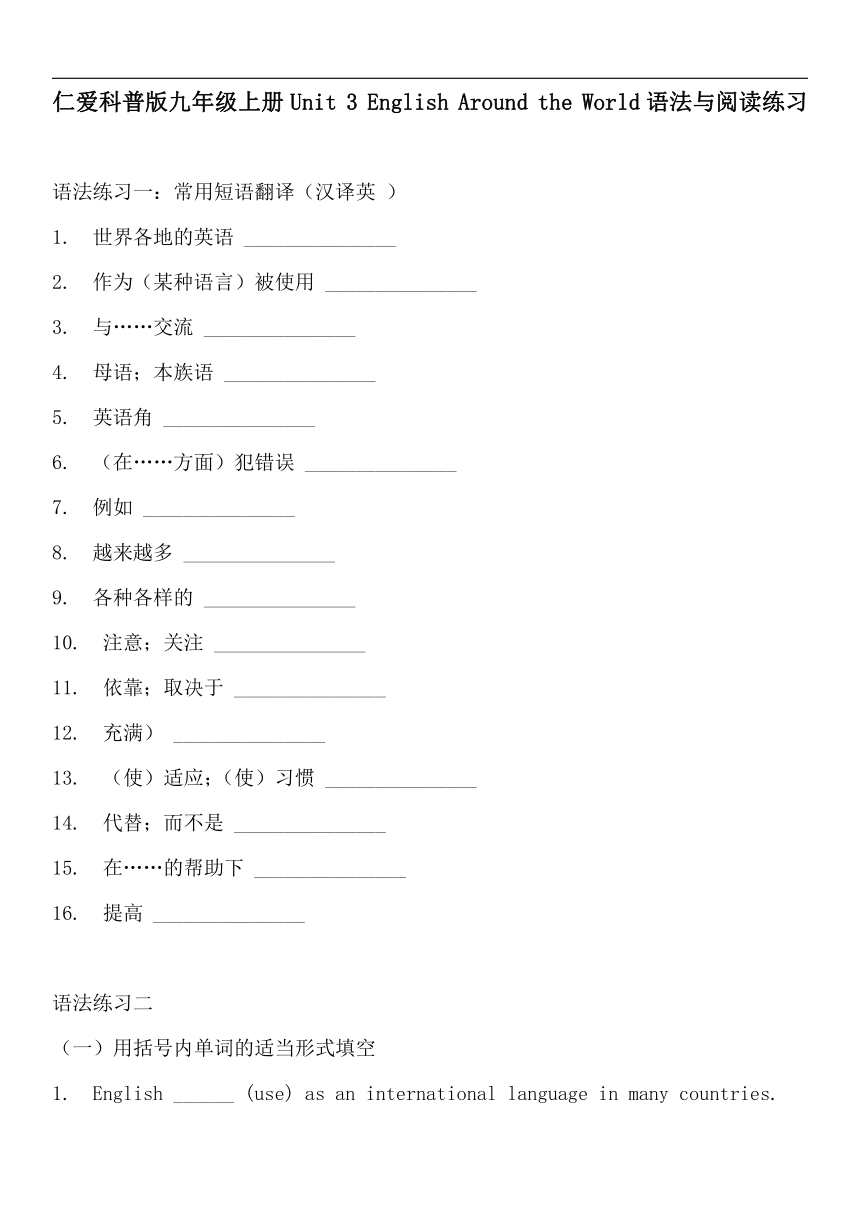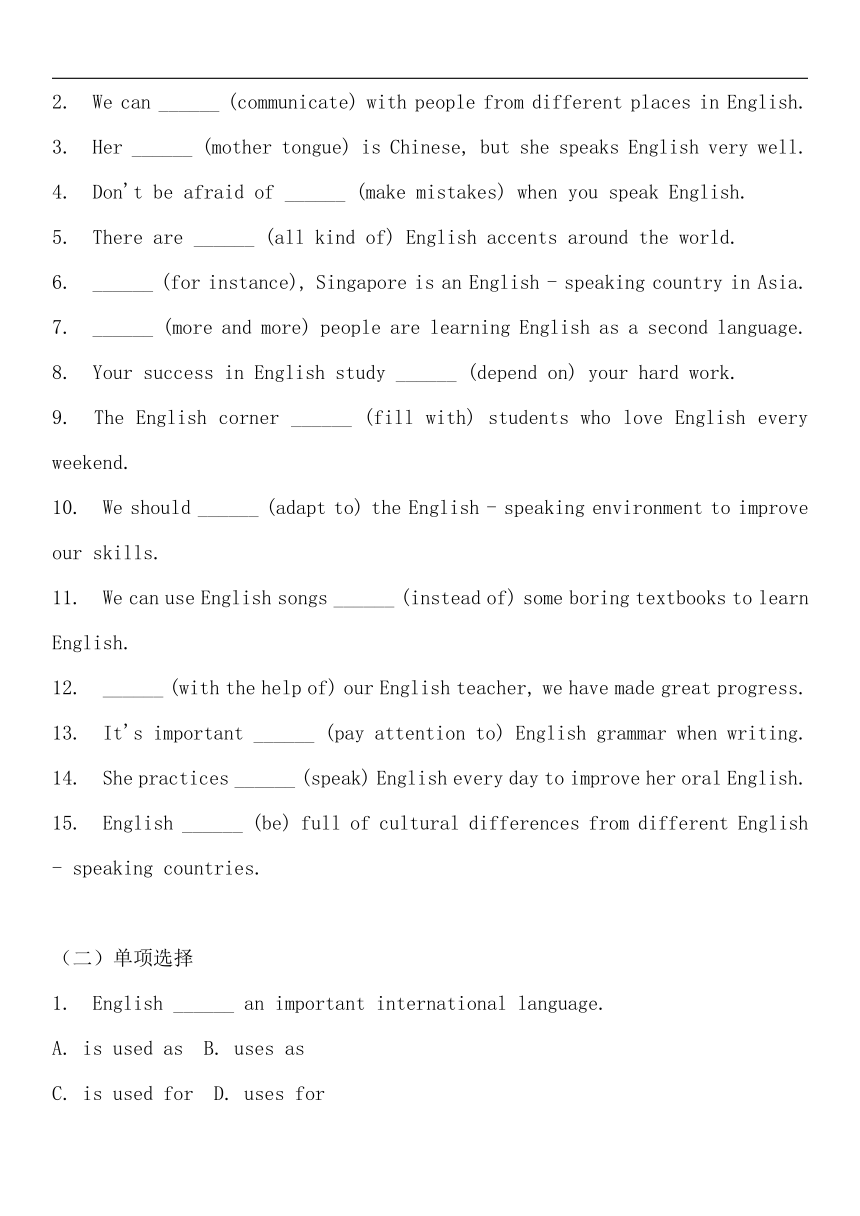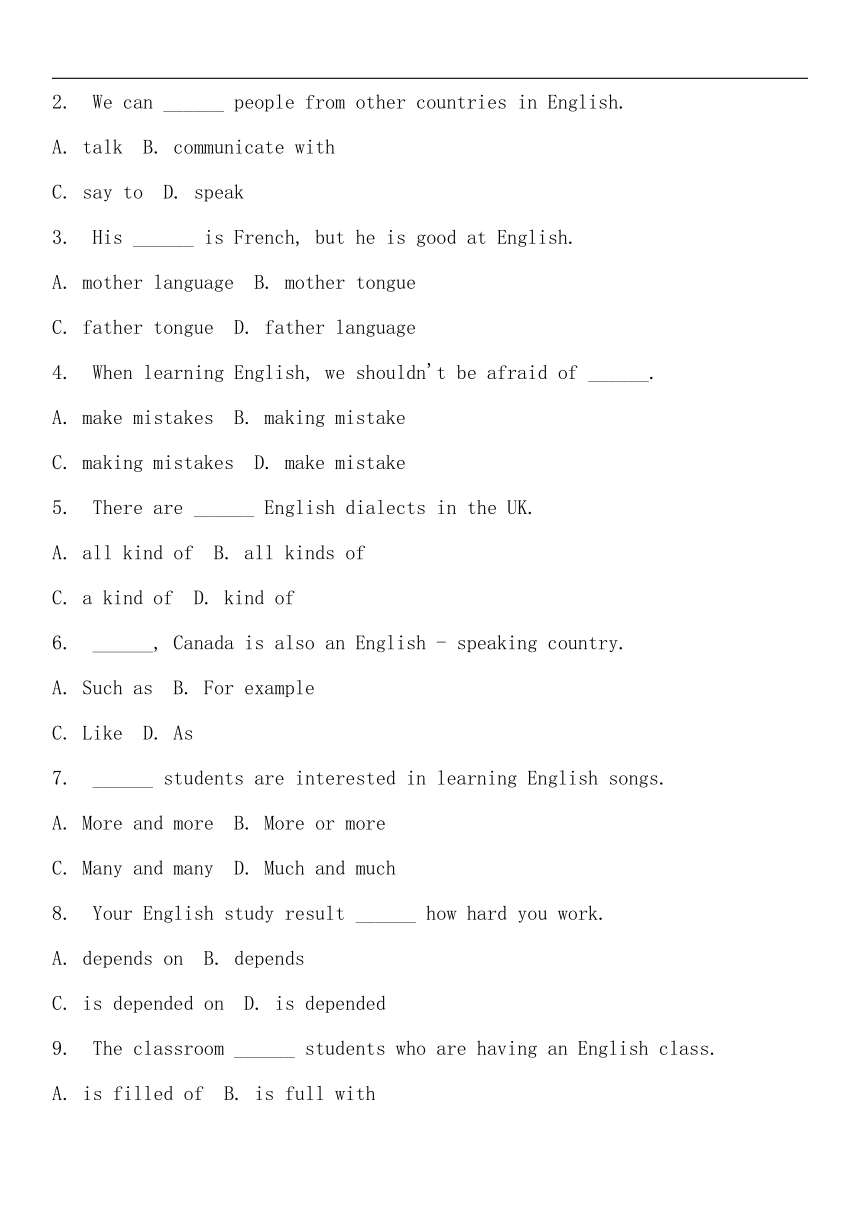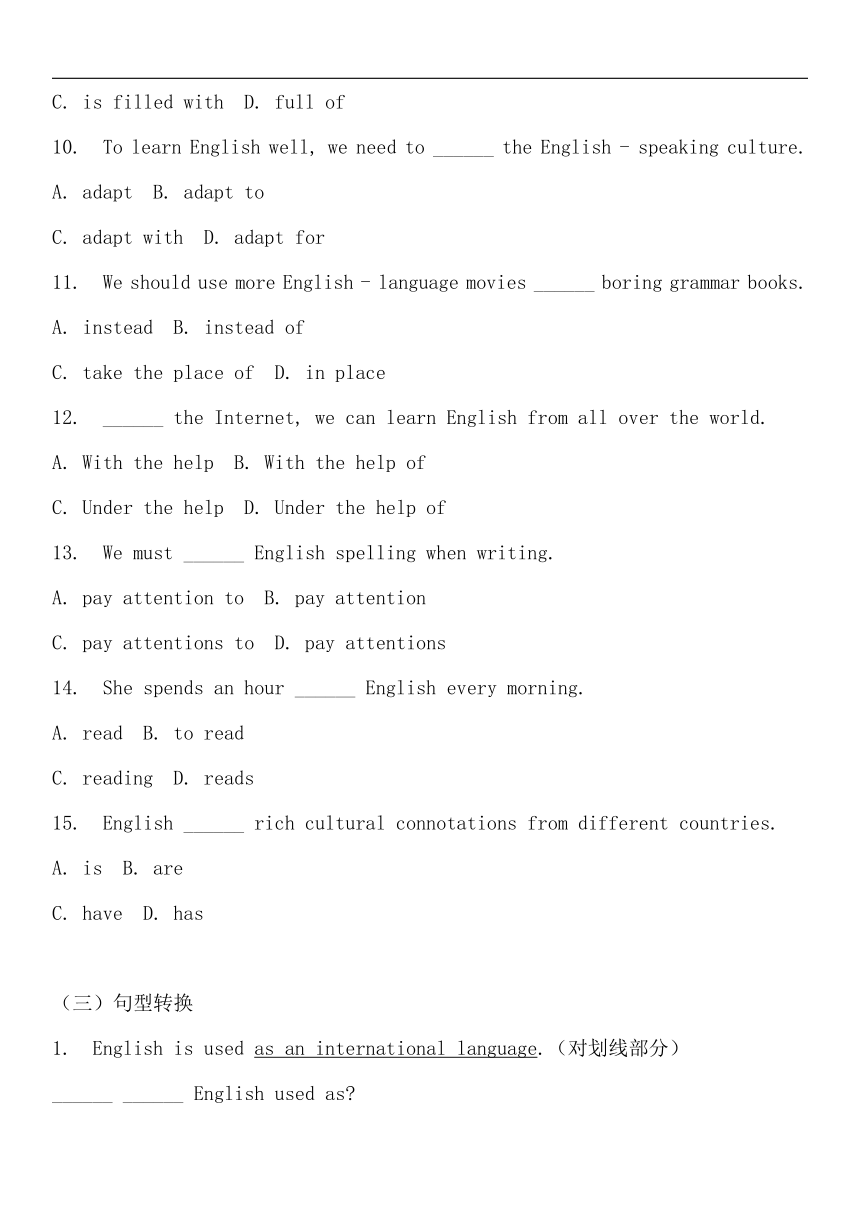Unit 3 English Around the World 语法与阅读练习(含答案)仁爱科普版英语九年级上册
文档属性
| 名称 | Unit 3 English Around the World 语法与阅读练习(含答案)仁爱科普版英语九年级上册 |

|
|
| 格式 | docx | ||
| 文件大小 | 21.6KB | ||
| 资源类型 | 教案 | ||
| 版本资源 | 仁爱科普版 | ||
| 科目 | 英语 | ||
| 更新时间 | 2025-07-08 18:30:57 | ||
图片预览




文档简介
仁爱科普版九年级上册Unit 3 English Around the World语法与阅读练习
语法练习一:常用短语翻译(汉译英 )
1. 世界各地的英语 _______________
2. 作为(某种语言)被使用 _______________
3. 与……交流 _______________
4. 母语;本族语 _______________
5. 英语角 _______________
6. (在……方面)犯错误 _______________
7. 例如 _______________
8. 越来越多 _______________
9. 各种各样的 _______________
10. 注意;关注 _______________
11. 依靠;取决于 _______________
12. 充满) _______________
13. (使)适应;(使)习惯 _______________
14. 代替;而不是 _______________
15. 在……的帮助下 _______________
16. 提高 _______________
语法练习二
(一)用括号内单词的适当形式填空
1. English ______ (use) as an international language in many countries.
2. We can ______ (communicate) with people from different places in English.
3. Her ______ (mother tongue) is Chinese, but she speaks English very well.
4. Don't be afraid of ______ (make mistakes) when you speak English.
5. There are ______ (all kind of) English accents around the world.
6. ______ (for instance), Singapore is an English - speaking country in Asia.
7. ______ (more and more) people are learning English as a second language.
8. Your success in English study ______ (depend on) your hard work.
9. The English corner ______ (fill with) students who love English every weekend.
10. We should ______ (adapt to) the English - speaking environment to improve our skills.
11. We can use English songs ______ (instead of) some boring textbooks to learn English.
12. ______ (with the help of) our English teacher, we have made great progress.
13. It's important ______ (pay attention to) English grammar when writing.
14. She practices ______ (speak) English every day to improve her oral English.
15. English ______ (be) full of cultural differences from different English - speaking countries.
(二)单项选择
1. English ______ an important international language.
A. is used as B. uses as
C. is used for D. uses for
2. We can ______ people from other countries in English.
A. talk B. communicate with
C. say to D. speak
3. His ______ is French, but he is good at English.
A. mother language B. mother tongue
C. father tongue D. father language
4. When learning English, we shouldn't be afraid of ______.
A. make mistakes B. making mistake
C. making mistakes D. make mistake
5. There are ______ English dialects in the UK.
A. all kind of B. all kinds of
C. a kind of D. kind of
6. ______, Canada is also an English - speaking country.
A. Such as B. For example
C. Like D. As
7. ______ students are interested in learning English songs.
A. More and more B. More or more
C. Many and many D. Much and much
8. Your English study result ______ how hard you work.
A. depends on B. depends
C. is depended on D. is depended
9. The classroom ______ students who are having an English class.
A. is filled of B. is full with
C. is filled with D. full of
10. To learn English well, we need to ______ the English - speaking culture.
A. adapt B. adapt to
C. adapt with D. adapt for
11. We should use more English - language movies ______ boring grammar books.
A. instead B. instead of
C. take the place of D. in place
12. ______ the Internet, we can learn English from all over the world.
A. With the help B. With the help of
C. Under the help D. Under the help of
13. We must ______ English spelling when writing.
A. pay attention to B. pay attention
C. pay attentions to D. pay attentions
14. She spends an hour ______ English every morning.
A. read B. to read
C. reading D. reads
15. English ______ rich cultural connotations from different countries.
A. is B. are
C. have D. has
(三)句型转换
1. English is used as an international language.(对划线部分)
______ ______ English used as
2. We communicate with foreigners in English.(改为一般疑问句 )
______ you ______ with foreigners in English
3. She improves her English by joining the English corner.(对划线部分提问 )
______ ______ she improve her English
4. More and more people learn English because it's useful.(对划线部分提问 )
______ ______ more and more people learn English
5. English is full of cultural differences.(改为同义句 )
English ______ ______ ______ cultural differences.
单元阅读能力提高
阅读短文,选择正确答案
English Around the Globe
English is one of the most widely used languages in the world. It is spoken as a native language in countries like the UK, the USA, Canada, Australia and New Zealand. In many other countries, it is used as a second language or a foreign language.
People use English to communicate in international business, travel, and education. For example, when a Chinese company does business with an American company, they often use English. In universities, many textbooks are in English, so students need to have a good command of English to study well.
There are also different varieties of English. British English and American English have some differences in spelling, pronunciation and vocabulary. But these differences don't prevent people from understanding each other.
With the development of globalization, English is becoming more and more important. Learning English well can open up more opportunities for people.
1. In which countries is English spoken as a native language
A. The UK, the USA, Canada, Australia and New Zealand
B. China, Japan, Korea
C. All Asian countries
D. All European countries
2. What do people use English for
A. International business, travel and education
B. Only for business
C. Only for travel
D. Only for education
3. What are the differences between British English and American English
A. Spelling, pronunciation and vocabulary
B. Grammar and sentence structure
C. Only spelling
D. Only pronunciation
4. Do the differences between British English and American English affect communication
A. Yes, they do
B. No, they don't
C. Sometimes they do
D. We don't know
5. Why is English becoming more and more important
A. Because of globalization
B. Because it's easy to learn
C. Because it's the most beautiful language
D. Because everyone likes it
答案
语法练习一
1. English around the world
2. be used as
3. communicate with... in English
4. mother tongue
5. English corner
6. make mistakes (in...)
7. for instance / such as
8. more and more
9. all kinds of
10. pay attention to
11. depend on
12. be full of
13. adapt to
14. instead of
15. with the help of
16. improve
语法练习二
(一)
1. is used
2. communicate
3. mother tongue
4. making mistakes
5. all kinds of
6. For instance
7. More and more
8. depends on
9. is filled with
10. adapt to
11. instead of
12. With the help of
13. pay attention to
14. speaking
15. is
(二)1. A;2. B;3. B;4. C;5. B;6. B;7. A;8. A;9. C;10. B;11. B;12. B;13. A;14. C;15. A
(三)1. What is2. Do; communicate3. How does4. Why do5. is filled with
单元阅读能力提高
1. A;2. A;3. A;4. B;5. A
语法练习一:常用短语翻译(汉译英 )
1. 世界各地的英语 _______________
2. 作为(某种语言)被使用 _______________
3. 与……交流 _______________
4. 母语;本族语 _______________
5. 英语角 _______________
6. (在……方面)犯错误 _______________
7. 例如 _______________
8. 越来越多 _______________
9. 各种各样的 _______________
10. 注意;关注 _______________
11. 依靠;取决于 _______________
12. 充满) _______________
13. (使)适应;(使)习惯 _______________
14. 代替;而不是 _______________
15. 在……的帮助下 _______________
16. 提高 _______________
语法练习二
(一)用括号内单词的适当形式填空
1. English ______ (use) as an international language in many countries.
2. We can ______ (communicate) with people from different places in English.
3. Her ______ (mother tongue) is Chinese, but she speaks English very well.
4. Don't be afraid of ______ (make mistakes) when you speak English.
5. There are ______ (all kind of) English accents around the world.
6. ______ (for instance), Singapore is an English - speaking country in Asia.
7. ______ (more and more) people are learning English as a second language.
8. Your success in English study ______ (depend on) your hard work.
9. The English corner ______ (fill with) students who love English every weekend.
10. We should ______ (adapt to) the English - speaking environment to improve our skills.
11. We can use English songs ______ (instead of) some boring textbooks to learn English.
12. ______ (with the help of) our English teacher, we have made great progress.
13. It's important ______ (pay attention to) English grammar when writing.
14. She practices ______ (speak) English every day to improve her oral English.
15. English ______ (be) full of cultural differences from different English - speaking countries.
(二)单项选择
1. English ______ an important international language.
A. is used as B. uses as
C. is used for D. uses for
2. We can ______ people from other countries in English.
A. talk B. communicate with
C. say to D. speak
3. His ______ is French, but he is good at English.
A. mother language B. mother tongue
C. father tongue D. father language
4. When learning English, we shouldn't be afraid of ______.
A. make mistakes B. making mistake
C. making mistakes D. make mistake
5. There are ______ English dialects in the UK.
A. all kind of B. all kinds of
C. a kind of D. kind of
6. ______, Canada is also an English - speaking country.
A. Such as B. For example
C. Like D. As
7. ______ students are interested in learning English songs.
A. More and more B. More or more
C. Many and many D. Much and much
8. Your English study result ______ how hard you work.
A. depends on B. depends
C. is depended on D. is depended
9. The classroom ______ students who are having an English class.
A. is filled of B. is full with
C. is filled with D. full of
10. To learn English well, we need to ______ the English - speaking culture.
A. adapt B. adapt to
C. adapt with D. adapt for
11. We should use more English - language movies ______ boring grammar books.
A. instead B. instead of
C. take the place of D. in place
12. ______ the Internet, we can learn English from all over the world.
A. With the help B. With the help of
C. Under the help D. Under the help of
13. We must ______ English spelling when writing.
A. pay attention to B. pay attention
C. pay attentions to D. pay attentions
14. She spends an hour ______ English every morning.
A. read B. to read
C. reading D. reads
15. English ______ rich cultural connotations from different countries.
A. is B. are
C. have D. has
(三)句型转换
1. English is used as an international language.(对划线部分)
______ ______ English used as
2. We communicate with foreigners in English.(改为一般疑问句 )
______ you ______ with foreigners in English
3. She improves her English by joining the English corner.(对划线部分提问 )
______ ______ she improve her English
4. More and more people learn English because it's useful.(对划线部分提问 )
______ ______ more and more people learn English
5. English is full of cultural differences.(改为同义句 )
English ______ ______ ______ cultural differences.
单元阅读能力提高
阅读短文,选择正确答案
English Around the Globe
English is one of the most widely used languages in the world. It is spoken as a native language in countries like the UK, the USA, Canada, Australia and New Zealand. In many other countries, it is used as a second language or a foreign language.
People use English to communicate in international business, travel, and education. For example, when a Chinese company does business with an American company, they often use English. In universities, many textbooks are in English, so students need to have a good command of English to study well.
There are also different varieties of English. British English and American English have some differences in spelling, pronunciation and vocabulary. But these differences don't prevent people from understanding each other.
With the development of globalization, English is becoming more and more important. Learning English well can open up more opportunities for people.
1. In which countries is English spoken as a native language
A. The UK, the USA, Canada, Australia and New Zealand
B. China, Japan, Korea
C. All Asian countries
D. All European countries
2. What do people use English for
A. International business, travel and education
B. Only for business
C. Only for travel
D. Only for education
3. What are the differences between British English and American English
A. Spelling, pronunciation and vocabulary
B. Grammar and sentence structure
C. Only spelling
D. Only pronunciation
4. Do the differences between British English and American English affect communication
A. Yes, they do
B. No, they don't
C. Sometimes they do
D. We don't know
5. Why is English becoming more and more important
A. Because of globalization
B. Because it's easy to learn
C. Because it's the most beautiful language
D. Because everyone likes it
答案
语法练习一
1. English around the world
2. be used as
3. communicate with... in English
4. mother tongue
5. English corner
6. make mistakes (in...)
7. for instance / such as
8. more and more
9. all kinds of
10. pay attention to
11. depend on
12. be full of
13. adapt to
14. instead of
15. with the help of
16. improve
语法练习二
(一)
1. is used
2. communicate
3. mother tongue
4. making mistakes
5. all kinds of
6. For instance
7. More and more
8. depends on
9. is filled with
10. adapt to
11. instead of
12. With the help of
13. pay attention to
14. speaking
15. is
(二)1. A;2. B;3. B;4. C;5. B;6. B;7. A;8. A;9. C;10. B;11. B;12. B;13. A;14. C;15. A
(三)1. What is2. Do; communicate3. How does4. Why do5. is filled with
单元阅读能力提高
1. A;2. A;3. A;4. B;5. A
同课章节目录
- Unit 1 The Changing World
- Topic 1 Our country has developed rapidly.
- Topic 2 The population in developing countries is
- Topic 3 The world has changed for the better.
- Unit 2 Saving the earth.
- Topic 1 Pollution has causes too many problems.
- Topic 2 All these problems are very serious.
- Topic 3 What can we do to protect the environment
- Unit 3 English around the World
- Topic 1 English is widely spoken around the world.
- Topic 2 Some things usually have different meaning
- Topic 3 Could you give us some advice on how to l
- Unit 4 Amazing Science
- Topic 1 When was it invented?
- Topic 2 I'm excited about the things that will be
- Topic 3 China is the third nation that sent a pers
